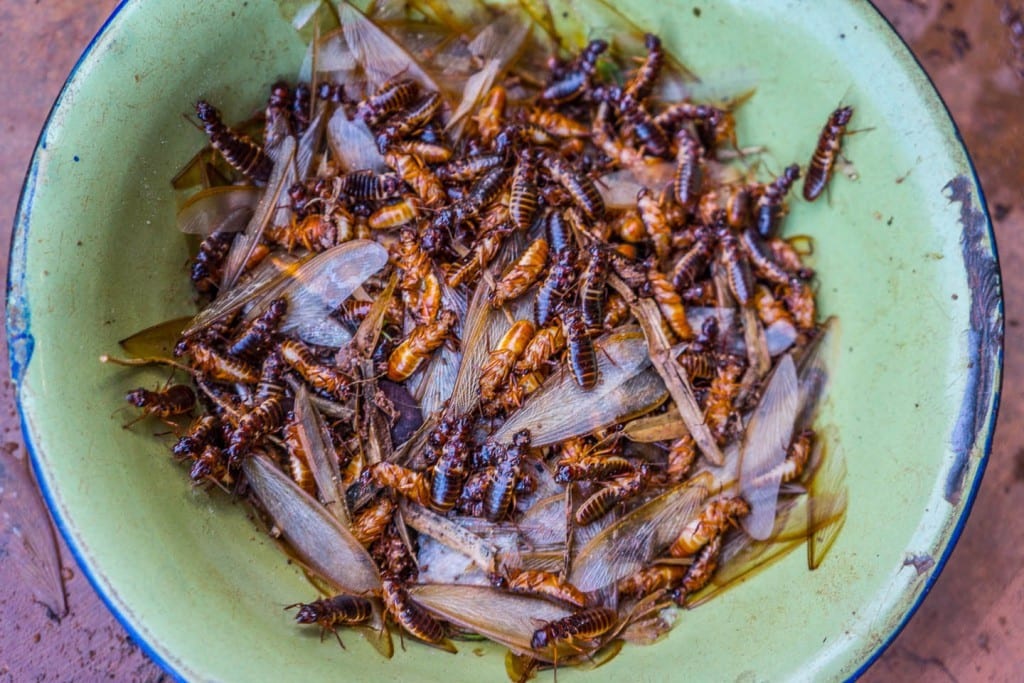Nutritional benefits of eating winged termites (“aku”) scientifically known as Macrotermes bellicosus
 One of the main health benefits behind edible insects are the large amounts of protein found in these small creatures.
One of the main health benefits behind edible insects are the large amounts of protein found in these small creatures.
In Nigeria, termites are usually roasted and eaten as food, mostly during the rainy season.
But can termites be the next therapeutic resource for the treatment of asthma, hoarseness and sinusitis, wounds, malnutrition and nutrient deficiency?
Recent studies suggest that, in addition to their ecological importance, termites are a source of medicinal and food resources to various human populations in various locations of the world, showing their potential for being used as an alternative protein source in human or livestock diets, as well as a source for new medicines.
Nigerian researchers have determined the nutrient composition and the toxicant level of the commonly eaten termites (Macrotermes bellicosus) castes in Niger-Delta region of Nigeria.
Macrotermes bellicosus are known to the Ibos as Aku; to the Hausa as Khiyea; Esusun in Yoruba; and Ebu in Annang.
The study titled “Evaluation of Nutritional Value of Termites (Macrotermes bellicosus): Soldiers, Workers, and Queen in the Niger Delta Region of Nigeria” was published in International Journal of Food Nutrition and Safety.
The researchers include: A. I. Ntukuyoh, D. S. Udiong, E. Ikpe, and A. E. Akpa Kpan of the Department of Chemistry, University of Uyo, Akwa Ibom State.
Queen, soldiers and workers of termites (Macrotermes bellicosus) were analyzed for proximate composition, vitamin, mineral elements and anti-nutrient content.
Proximate composition showed that crude protein content of the soldiers was higher than those of workers and Queen. The highest mineral element was sodium in queen, while the least mineral was manganese in the soldiers. The termites were rich in vitamins A and C. Workers termites had the highest vitamin C content, while Queen had the highest vitamin A content. Anti-nutrient compositions in Macrotermes bellicosus were considerably low.

Macortermes bellicosus constitute a significant component of diet among the people of the Niger-Delta region in Nigeria.
A number of insect and their products are used as food items in some parts of Nigeria and to a large extent eaten as tit bits or exclusively by children. Insects have played an important role in the history of human nutrition and it is probable that the first hominids in African were eating insects. Insects including termites are good sources of protein with high fat content (and thus energy) and many important minerals and vitamins.
.
.
Also, a recent review has shown that termites are commonly used insects in traditional popular medicine. They are used in the treatment of various diseases that affect humans, such as influenza, asthma, bronchitis, whooping cough, sinusitis, tonsillitis and hoarseness.
The study titled “Edible and medicinal termites: a global overview” was published in the Journal of Ethnobiology and Ethnomedicine and BioMed Central.
According to the study, additionally, these animals have historically been an important source of food that may contribute to improving human diet, particularly for people who suffer from malnutrition due to a deficit of protein, as they are considered a non-conventional food with great economic and social importance. They have been consumed for generations in many regions of the world, a practice that has increased in popularity in recent years.
The use of termites as a therapeutic resource also revealed an important mode of use of these animals. Evidence of antimicrobial activity of products isolated from these animals has been reported, such as peptides like espinigerine and termicine, isolated from Pseudocanthotermes spiniger, which showed antifungal and antibacterial activities.
An Extract from ;
http://vibesngists.blogspot.com.ng/2016/06/benefitd-of-eating-winged-termites.html#more
Dr Gilbert Ezengige is a licensed natural medicine practitioner, lecturer and writer on health and social issues.





No comments:
Post a Comment